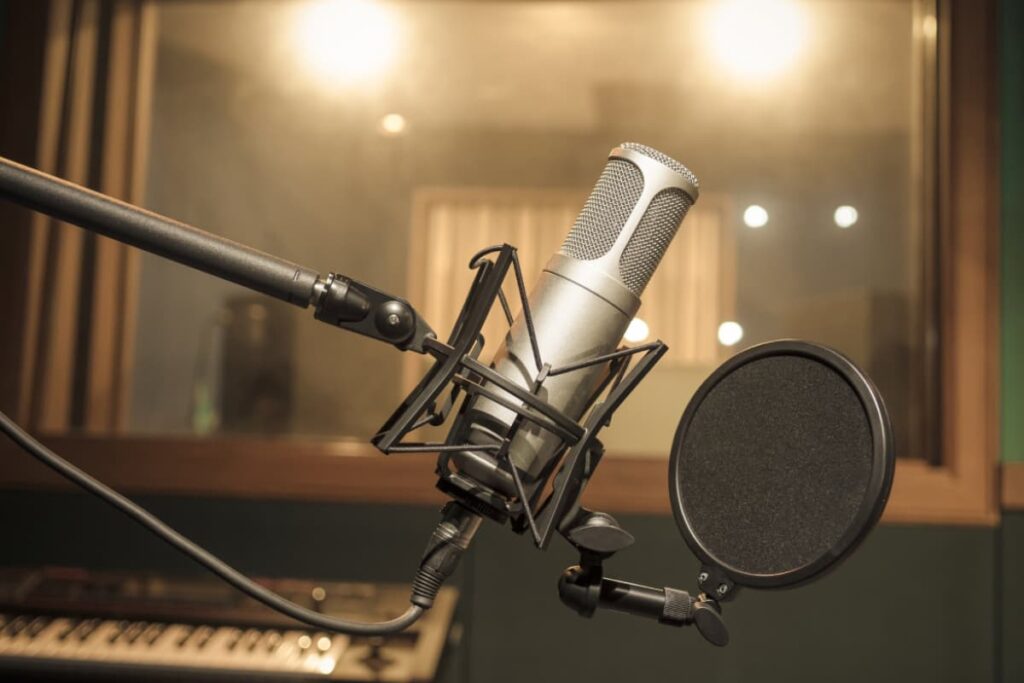You want to record your voice for a new song or a podcast, but your microphone won’t stop picking up every little hum or buzzing noise in the background.
Excessive microphone sensitivity has always plagued home recording studios, especially because it can happen suddenly. However, this problem never appears without reason, and you can pinpoint what’s causing it.
Here are some common reasons why your microphone is so sensitive:
- It’s a condenser.
- The settings on your computer are wrong.
- You’re too far away from it.
- You’re using converters.
- Your recording room is not set up correctly.
- Your mic pattern is wrong.
- Your mic cables aren’t balanced.
Let’s examine these reasons and see what you can do to correct an overly sensitive mic. By the end of the article, you’ll hopefully be able to enhance your recording experience significantly.
Table of Contents
- Why is My Microphone so Sensitive?

Why is My Microphone so Sensitive?
Here are the 7 common reasons why your microphone may be sensitive:
1. It’s a Condenser
Condenser microphones are designed to be extremely sensitive, unlike dynamic microphones.
When hit by sound waves, they rely on a membrane that moves relative to a metal plate. Since this membrane is extremely thin, it can be moved by even the weakest sound waves.
This mic quality feature is generally helpful because it allows you to record your voice in amazing high-quality audio, and it also allows you to spot any mistakes and flaws in your performance.
This allows you to make the recording even better during production, or you can choose to record again if you’re dissatisfied with how it sounds.
Mic Sensitivity
However, the mic sensitivity of condenser microphones can also be a hindrance.
Since it is very good at detecting noise, it will pick up almost any sound. Sometimes, it may pick up things you can’t even hear yourself.
Therefore, using a condenser microphone in a soundproofed room with proper acoustics is important since it is more difficult to fix mic sensitivity. Recording this way will allow you to block out the noise outside the room so your condenser microphone can focus solely on your voice.
If nothing else, you can use an isolation shield or cover yourself and the microphone with a blanket while recording.
2. The Settings on Your Computer Are Wrong
A common reason your microphone is too sensitive is that it is set up that way in the settings on your computer or your DAW.
This problem is easily fixable since you can navigate to your settings and change them.
Adjust Mic Sensitivity
To adjust microphone sensitivity settings on Windows, use the following steps to help decrease sensitivity and fix mic sensitivity:
- Navigate to the system settings.
- Find the sound section.
- Find your microphone and click on “Device Properties.”
- Go to “Additional Device Properties.”
- Left-click on “Levels” and adjust them.
You can similarly tweak the sound settings in your DAW to fix mic sensitivity. However, when you decrease your overall microphone sensitivity, you’ll make everything quieter, including your voice.
The unwanted background noise will seem to disappear simply because it’s quieter than your voice; you won’t be able to hear it when you decrease mic sensitivity, but it’ll still be there if you turn it up.
Therefore, this is not the best option for fixing mic sensitivity. However, it is a good quick fix if you don’t have time to get into details.
3. You’re Too Far Away From It
If your microphone seems too sensitive because it’s picking up random noises from the background, it might be because those noises are loud relative to your voice.
In other words, you must make your voice louder to drown out and minimize background noise.
Vocal Distance to fix mic sensitivity
Getting closer to your microphone device is the best way to do this. Speaking directly into it will make your voice louder relative to the background noise, which means that the microphone will pick it up rather than the sounds of your neighbors or roommates.
4. You’re Using Converters
You can run into problems if you use too many converters to connect your microphone to your computer.
For example, using an XLR to 3.5 mm (1/8-inch) converter and then a USB converter might increase the mic volume of any hum or buzzing sound in the background.
Instead, you should use an XLR cable and connect it to an audio interface with a decent preamp and phantom power (if you’re using a condenser).
This will help you avoid all the unnecessary in-between steps and deliver the mic signal from your microphone to your DAW without amplifying background noises and diminishing the sound quality.
5. Your Recording Room Is Not Set Up Correctly
It’s very difficult to make decent audio recordings if there is no soundproofing in your audio recording room or if the acoustics of your room are terrible.
If there is a lot of background noise from your neighbors leaking into the room, it will be picked up by your mic no matter how drastically you adjust the mic sensitivity. If the acoustics of your room are terrible, the sound waves will bounce around and give you trouble.
Noise Suppression
Investing in acoustic panels is a great way to create better acoustics in your room. Likewise, blocking out the noise from your surroundings will do wonders for your sound quality and noise suppression.
6. Your Mic Pattern Is Wrong
Mic pattern is the direction your microphone picks up the sound. Your microphone can pick up sounds from one or more sources.
Many microphones have a cardioid setting, which opens only one side of your microphone and focuses on only one direction. Use this setting whenever possible to reduce the amount of noise you get.
7. Your Mic Cables Aren’t Balanced
Always use balanced cables if it’s a possibility.
Unbalanced cables are made for connecting instruments to amps. They do a good job of that, but they’re less effective when connecting microphones.
Therefore, for the best results, use an XLR cable, which will transfer the signals from your mic to your DAW or whatever else you’re using without picking up any noise and will provide crystal clear audio output when you record audio.
You should also ensure you’re not running a cable next to another cable.
These surrounding cables may make noises that your ears cannot hear, but your microphone cable can pick up, distorting your sound and affecting your audio recording.
- Review of the ALABS IRON MINI-WL: A Powerhouse Wireless Microphone - October 4, 2023
- What is a Saturator in Music Production: A Brief Explanation - May 11, 2023
- What Are Rotary DJ Mixers? An Overview - May 11, 2023
SoundStudiomagic.com is a participant in the Amazon Services LLC Associates Program, an affiliate advertising program designed to provide a means for sites to earn advertising fees by advertising and linking to Amazon.com. We also participate in other affiliate programs which compensate us for referring traffic.

